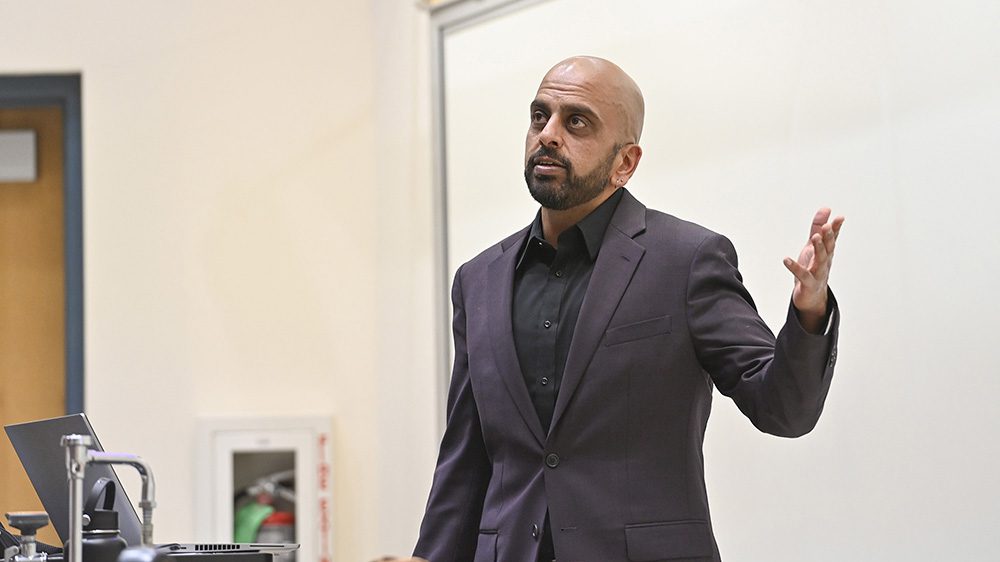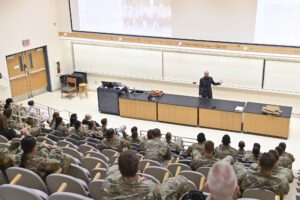Khawaja ’02: Integrations, Intersections—and the Institute

Salmaan Khawaja ’02, PsyD, delivers the keynote address during the Undergraduate Research Symposium in March 2025.—VMI Photo by H. Lockwood McLaughlin.

Salmaan Khawaja ’02, PsyD, delivers the keynote address during the Undergraduate Research Symposium in March 2025.—VMI Photo by H. Lockwood McLaughlin.
“We’re just trying to apply a VMI common sense to medicine.” That’s what Salmaan Khawaja ’02, PsyD, EdS, LCP, has to say about his unique medical specialty—one that has as its goal helping patients with mental health challenges address those issues through an integrative lens that sees the mind and body as connected.
At Bon Secours Mercy Health Neurology Clinics in Midlothian, Virginia, Khawaja serves as program director of the Neuropsychology Service Line and maintains a wide-ranging practice, seeing patients from children to the elderly with conditions ranging from developmental delays to schizophrenia to Alzheimer’s disease, as well as conditions that can strike at any age, such as stroke and traumatic brain injuries. As part of this commitment to wrestling with the spectrum of human experience, Khawaja also serves as an expert witness, frequently testifying in state and federal courts on cases that can include assaults and homicides of all types, including high-profile school shootings.
It’s a career Khawaja never would have imagined when he matriculated from Aurora, Illinois, seeking a different path than the one his cardiologist father, who’d immigrated from Pakistan during the 1960s, had hoped his youngest son would follow. Along with his two older brothers, Khawaja had attended Marmion Academy, a Catholic independent school then known as Marmion Military Academy, and he’d planned on attending one of the federal service academies. In the end, Khawaja got into those schools, plus several Ivy League universities, but the lure of VMI’s untraditional journey was strong.
“I grew up in an upper-middle-class family,” Khawaja explained. “And I wanted to challenge myself to see if I could do something on my own before going out into the world where I knew if I needed the support, I would have it. I wanted to do something that wasn’t following the footsteps of everybody else in my family.”
Khawaja’s decision to break free of expectations didn’t go over well at home, and when August 1998 rolled around, Khawaja found himself landing at the Roanoke airport alone. “I had my stuff in a bag, and I took a taxi [to Lexington], and I matriculated on my own,” he noted.
Despite wanting to blaze his own trail, Khawaja wasn’t opposed to following his father into the medical field, and he declared a biology major. Academically, he thrived, earning academic stars and enjoying the mentorship of Col. Wade Bell, Ph.D., and Col. Tom Baur ’75, Ph.D., among many others. Outside of the classroom, Khawaja was involved in a wide variety of activities, helping to build the cadet EMT program, serving as a cadre sergeant, and playing ice hockey. An avid musician, he was a member of Band Company and served as regimental drum major in his 1st Class year.
Then 9/11 happened—and both the world and Khawaja’s intended career path were forever altered. Struggling to make sense of the terrorist attacks that had sent shock waves around the globe, Khawaja went to talk to Bell, asking him, “How do you get someone who’s not suicidal to commit suicide, or worse, become a suicide bomber and kill others? How does that even happen?”
Bell’s simple answer opened a door Khawaja hadn’t foreseen: “That’s not a question for biology. That’s a question for psychology.” Next, Khawaja walked across post and spoke with Col. James Gire, Ph.D., longtime chair of the psychology department, who answered the cadet’s question with a question of his own: “Why don’t you take one of my courses and then we’ll see if we can’t answer some of these questions?”

Cadets listen while Salmaan Khawaja ’02, PsyD, speaks during the Undergraduate Research Symposium in March 2025.—VMI Photo by H. Lockwood McLaughlin.
Khawaja recalls being “absolutely hooked” on psychology, and the next spring, thanks to loading up with additional credit hours, he graduated with a Bachelor of Arts degree in biology and a minor in psychology. Graduate school was the obvious next destination—and Khawaja credits Bell, Gire, Baur, and Col. Richard “Dick” Rowe, Ph.D., with being “remarkably influential” in finding a program best serving his interests while not requiring a move to a major city. By the time he graduated, Khawaja had been dating his Ring Figure date and now-partner, Laura, for 2 years, and because she was in law school at the University of Richmond, an in-state graduate school was a must.
In 2006, Khawaja earned both a Master of Arts and an Educational Specialist degree from James Madison University, and a year later, he followed that up with a Doctor of Psychology degree, also from JMU. This type of degree typically takes 8 years of post-graduate work, but Khawaja completed his in 5 years. He attributes this to his time at VMI where “a VMI cadet can get more done in a day than most do in a week.” Then, he completed his internship at Eastern Virginia Medical School and his fellowship training in Richmond, Virginia, with an emphasis on inpatient and outpatient care.
With a terminal degree in his field, Khawaja was set to begin in earnest answering the kinds of questions 9/11 had engendered—and forging his own path, just as he had as a teenager leaving Illinois. “I’m working at the intersection of neurology, psychiatry, and psychology,” he explained. “It’s where all of those things meet. We look at how issues going on in the brain affect someone’s thinking, their behavior, and their mood.”
But Khawaja’s day-to-day isn’t just about going to the office and seeing patients, with the occasional day in court. Because of his multidisciplinary background, Khawaja is often called to consult on the cases that keep medical professionals awake at night—the ones where doing what’s right isn’t clear-cut, and the patient may not have the ability to give consent freely.
“So I’m an embedded provider with a hospital system and routinely do consults on [neurology] and [obstetrics/gynecology] and rehab floors, the ICU, and emergencies,” Khawaja explained. “For example, I’m part of the team that tests for brain death in a patient when families are deciding whether or not they are going to pull the plug. I get called to the OB floor when a patient delivers a baby, but did not know they were pregnant, so the question is whether they have the capacity to care for a child or not. I get called to determine if a patient has dementia or delirium.”
These cases and others like them take more than textbook knowledge or even the knowledge that professionals in any field accumulate over the course of their careers; they require a deep-seated commitment to ethics and character, ideally honed over a lifetime. For Khawaja, the lessons he learned on post are an anchor, a palpable touchpoint when doing the right thing is hard, messy, and complicated.
“When there are gray areas in terms of clinical decision-making, what I rely on is to always speak the truth, no matter how hard it is. … Ethics can be messy. So is life. So is work. But VMI has taught me to keep speaking the truth, no matter how hard it is.”
Salmaan Khawaja ’02, PsyD, EdS, LCP
“Ethics plays a major role in my day-to-day,” he stated. “At VMI, the Honor Code was so clear—and so binary. There was no need to deliberate right versus wrong when it is clearly spelled out when it comes to lying, stealing, and cheating. I recently gave the keynote address at the [Undergraduate Research Symposium] and spoke a little about what being honorable means. Sometimes being honorable and ethical means considering the needs and the condition of the person to whom you are speaking. If a patient with advanced dementia asks me if they are actively dying, do I tell them yes, knowing that saying so will cause harm, and they will forget the question and ask again in 5 minutes, and thus I will cause them harm again? How do I tell a child they are going to die from the brain tumor we just found? How do you make ethical decisions when the decision isn’t binary?”
The liberal arts courses he took at VMI, Khawaja asserts, gave him the basis to wrestle with questions such as these. “That’s where I got to debate and discuss right versus wrong—some of the international studies courses I took, along with my philosophy and ethics and leadership courses, allowed me to try and see things from differing perspectives,” he stated. “I grew up in a religiously conservative household, and coming to VMI and having late-night talks with my BRs, as well as discussions with professors and coursework, all played a role in how I apply ethical decision making to my work.”
Undergirding all of this, of course, is the VMI Honor Code. “I’m constantly under audit from insurance or Medicare or the hospital system itself, and have never once been found to have been billing inaccurately because the Honor Code is part of my blood—and thus ‘doing the right thing because it’s the right thing to do,’ is a motto of mine. When there are gray areas in terms of clinical decision-making, what I rely on is to always speak the truth, no matter how hard it is. … Ethics can be messy. So is life. So is work. But VMI has taught me to keep speaking the truth, no matter how hard it is.”

Salmaan Khawaja ’02, PsyD, with his partner, Laura, and their children in Richmond, Virginia, in fall 2024.—Photo courtesy Khawaja.
Away from work, Khawaja stays busy, to put it mildly. He and Laura, now an attorney for Capital One, are parents of five children, with ages ranging from 2-year-old twins to age 11. Khawaja is also the class agent for 2002—a position he’s held ever since graduation. And while many people with a demanding job and large family would be doing well just to hold it all together, Khawaja even has time for hobbies, including playing the drums, beekeeping, and baking bread. “One day I’ll figure out how to not mess up a croissant,” he laughed.
VMI, he explained, laid the foundation to drink from the firehose—and just keep drinking as responsibilities ratchet upward. “It’s clinical judgment, quick thinking, crisis management, time management, prioritization, and the ability to accomplish tasks efficiently without making anyone feel minimized,” he explained. “I gained a lot of life skills [at VMI].”
Seeing such a span of human experience—from individuals who are finding quiet ways to flourish despite severe disabilities or limitations to those who aren’t meeting life’s obstacles head-on even with plenty of family or financial support—has left Khawaja with an informed perspective on how we as a society can help those who are struggling.
Asked if he sees more hope or despair for the human race, he is quick to reply that he sees both.
“There is tremendous hope and humanity in people, and I’ve realized that people are a lot more resilient if you can empower them with the tools they need to be resilient,” he stated.
“And that brings me a lot of hope, because we’re trying very hard to provide access to more and more people, so it’s not so income dependent. One of the things I love about working for a nonprofit, and it reminds me of VMI, is that everyone is treated the same. I treat a patient with no insurance or with really [bad] insurance exactly the same and give them the same tests and the same degree of service that I give someone who’s paying private or out of pocket,” he continued.
At the same time, Khawaja is more than aware that not everyone can find their way to a nonprofit healthcare system with sliding scale fees, and the U.S. healthcare system overall isn’t designed to put patients first. It’s a situation that comes into especially sharp focus at the end of life.
“I can’t tell you how many people have died, and I’ve been in there when they’ve died,” he said. “During COVID, I was in the room with so many people. They were dying, left to right—many people. And the biggest despair in all those moments is that I wish we could have done X, had they had the money. If they had the insurance, we could have done X.” These patients, Khawaja explained, weren’t the patients he sees in his clinic—he’d been called to consult on their cases, and he knew what had led to this sad point in their lives—because they had either no insurance or substandard insurance, they’d delayed seeking care until they couldn’t be helped.
In cases like that, some might be tempted to give in to soul-crushing despair. VMI, though, taught Khawaja to do the best he can with the resources currently at his disposal—and that’s what he tries to do every day. What’s more, the additional obstacles he faced on post—including a family not fully supportive of his decision to matriculate and the fact that not many cadets on post shared his background—deepened his experience of VMI’s already adversarial system and forced him to look inward for strength.
“The adversity that I experienced has made me into a better person and has helped shape me,” he stated. “It’s made me a better doctor, a better father, a better partner, and a better person.”
And as his children get older, Khawaja sometimes wonders whether a future Keydet or two is growing up under his roof. “If my children want to come here, I would be fine with that,” he commented. “I like the direction that VMI is going. The value in terms of not just the academics, but the other experiences, and perhaps most importantly, the relationships you build here are lifelong.”

The development writer plays a key role in producing advancement communications. This role imagines, creates, and produces a variety of written communication to inspire donors to make gifts benefiting VMI. Utilizing journalistic features and storytelling, the development writer will produce content for areas such as Annual Giving, stewardship, and gift planning.